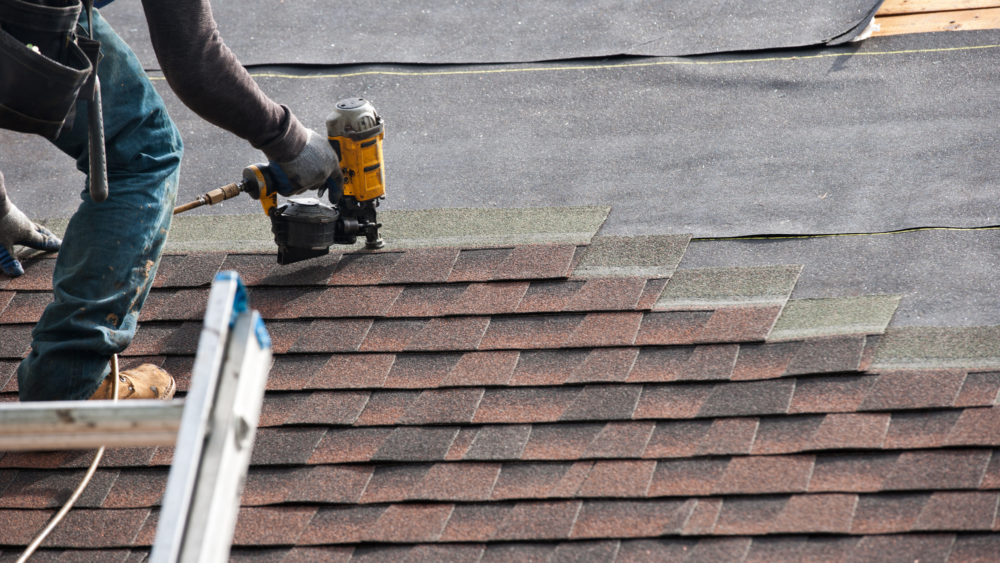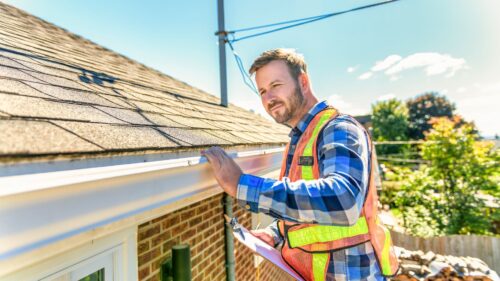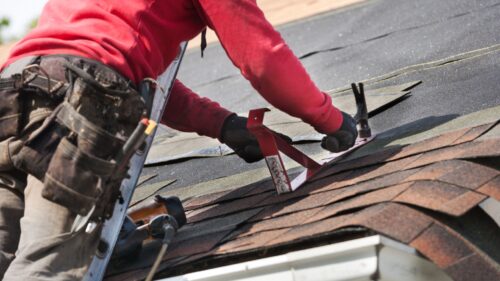When it’s time to give your home a facelift, choosing the right roofing company becomes critical. With all the choices out there, you might wonder how to spot that perfect find. It’s not just about slapping some shingles on your roof; it’s about finding skilled hands that will care for your home as much as you do. Let’s get into the nitty-gritty of what really makes a roofing partnership soar or sink.
Importance of Hiring a Professional Roofing Contractor
When it comes to your roof, you can’t afford to take chances. Your roof is your home’s first line of defense against the elements. It’s the shield for you and your loved ones, keeping everyone cozy and protected from the elements. That’s why it’s so important to hire a professional roofing contractor when you need repairs or a replacement. A pro has the experience, expertise, and equipment to get the job done right. Sure, you might be tempted to tackle a roofing project yourself to save a few bucks. But trust me, it’s not worth the risk. Roofing is a dangerous job that requires special safety precautions and tools. One wrong step and you could be looking at a serious injury. And let’s be real, without knowing what you’re doing, there’s a good chance you might just make things worse for your roof. So, if you put off those repairs, brace yourself for an even heftier bill later on.
Benefits of Hiring a Professional Roofing Contractor
When you hire a reputable roofing company, you can rest easy knowing your roof is in good hands. A professional contractor will:
- Use high-quality materials and proper installation techniques
- Follow all local building codes and regulations
- Provide a warranty on their work
- Have insurance to protect you in case of accidents or damage
Legal Requirements for Roofing Contractors
Did you know that roofing contractors are required by law to have certain licenses and insurance? It’s true. All these rules are here for a good reason – to keep homeowners like you safe and sound. Before you hire a contractor, make sure they have:
- A valid business license
- Workers’ compensation insurance
- General liability insurance
If a contractor can’t provide proof of these things, keep looking. It’s not worth the risk to work with an unlicensed or uninsured roofer.
Key Factors to Consider When Choosing a Roofing Contractor
Okay, so you know you need to hire a pro for your roofing project. But with so many contractors out there, how do you choose the right one? Here are a few key factors to consider: As I mentioned before, it’s crucial to make sure any contractor you’re considering is properly licensed and insured. So, don’t hesitate to ask for some solid evidence. A reputable contractor will be happy to provide it.
Evaluating Experience and Expertise
When it comes to something as important as your roof, you want a contractor with plenty of experience. Look for a company that’s been in business for several years and has a proven track record of quality work. It’s also a good idea to ask about the specific experience and training of the crew that will be working on your roof. Are they certified by the manufacturer of the roofing materials being used?
Understanding the Importance of Local References
One of the best ways to gauge the quality of a roofing contractor is to talk to their previous customers. Ask the contractor for a list of local references you can contact. When you reach out to these references, ask about their experience with the contractor. Did the work meet their expectations? Did the project stay on schedule and on budget? Would they hire the contractor again?
How to Evaluate Roofing Contractor Proposals
Once you’ve narrowed down your list of potential contractors, it’s time to get some proposals. But don’t just go with the lowest bidder. Make sure you give each proposal a good look-over, ensuring that when you’re making comparisons, it’s like comparing apples with apples.
Understanding the Components of a Roofing Proposal
A thorough roofing proposal should include:
- A detailed description of the work to be done
- The estimated project timeline
- The total cost, broken down by materials and labor
- Information about the roofing materials to be used
- Any applicable warranties
If a proposal is missing any of this key information, ask the contractor to clarify. You don’t want any surprises once the project is underway. It’s a good idea to get proposals from at least three different contractors. This will give you a sense of the going rate for your project. Keep in mind that the lowest price isn’t always the best deal. A suspiciously low bid could be a red flag that the contractor is cutting corners or using subpar materials.
Importance of a Detailed and Clear Proposal
The proposal is your roadmap for the project. It should spell out exactly what work will be done, how long it will take, and how much it will cost. Be sure your proposal packs a punch with details but stays clear enough for anyone to get it. If anything is unclear, don’t be afraid to ask questions. A good contractor will be happy to walk you through the details and address any concerns you may have.
Ensuring Effective Communication and Transparency
Communication is key to any successful roofing project. You should feel comfortable talking to your contractor and confident that they will keep you in the loop throughout the process.
Establishing Clear Expectations
Before the project starts, sit down with your contractor and discuss your expectations. Make sure you’re on the same page about things like:
- The project timeline
- Work hours
- Access to your property
- Clean-up procedures
The more clearly you communicate your expectations upfront, the smoother the project will go. A good contractor will keep you informed about the progress of your project. They should provide regular updates, either in person, by phone, or by email. If you have any questions or concerns along the way, don’t hesitate to reach out to your contractor. They should be responsive and willing to address any issues that come up.
Addressing Concerns and Questions Promptly
Even the best-laid plans can hit snags. If something comes up during your roofing project, it’s important to address it promptly. Whether it’s an unexpected issue with your roof or a miscommunication with the crew, your contractor should be willing to work with you to find a solution. When you’re on the hunt for a contractor, make sure to pick someone who’s not only quick to respond but also adaptable and genuinely invested in making you happy with the outcome.
Verifying Proper Licensing, Insurance, and Certifications
I can’t stress enough how important it is to work with a properly licensed and insured roofing contractor. But what exactly does that mean? Here’s what you need to know. Most states require roofing contractors to be licensed. This means they have met certain requirements and passed an exam to demonstrate their knowledge and skills. Working with a licensed contractor protects you as a homeowner. If something goes wrong with the project, you have recourse through the state licensing board.
Types of Insurance Coverage Required
There are two main types of insurance that roofing contractors should carry:
- Workers’ compensation insurance: This covers medical expenses and lost wages for workers who are injured on the job.
- General liability insurance: This protects you in case the contractor damages your property or if someone is injured on your property during the project.
Ask to see proof of both types of insurance before you sign a contract. And make sure the coverage is up to date and sufficient for your project.
Relevant Certifications and Training
In addition to licensing and insurance, look for a contractor with relevant certifications and training. For example, some manufacturers offer certification programs for contractors who use their products. These certifications show that the contractor has undergone specialized training and is knowledgeable about the specific products and installation techniques.
Assessing the Quality of Materials and Workmanship
The quality of the materials and workmanship can make or break your roofing project. So, if you’re on the hunt for top-notch results, here’s a handy guide to what you should keep your eyes peeled for. Not all roofing materials are created equal. Some are more durable, energy-efficient, or aesthetically pleasing than others. Talk to your contractor about the pros and cons of different material options. They should be able to recommend products that fit your budget, climate, and style preferences.
Understanding Warranty Coverage
Most roofing materials come with a manufacturer’s warranty. This protects you in case the product fails prematurely due to a defect. However, the warranty is only valid if the product is installed correctly. That’s why it’s so important to choose a contractor who follows the manufacturer’s guidelines and industry best practices.
Inspecting Previous Work Samples
Honestly, if you really want to gauge how good a contractor’s work is, there’s nothing like checking it out with your own eyes. Ask to see photos or even visit previous projects they’ve completed. Pay attention to the details, such as the straightness of the roofline, the tightness of the flashing, and the overall appearance of the finished product. If you see any red flags, trust your gut and keep looking for a different contractor.
Considering Local Presence and Reputation
When it comes to roofing, local expertise matters. Here’s why it pays to choose a contractor with a strong presence and reputation in your community. A local contractor is more likely to be familiar with the unique challenges of your climate and building codes. They’ll know which materials and techniques work best in your area. Plus, a local contractor has a vested interest in maintaining a good reputation in the community. They’re more likely to stand behind their work and be there if you need them down the road.
Evaluating Online Reviews and Testimonials
Diving into online reviews and testimonials can offer you a treasure trove of insights about what it’s really like to work with a contractor, shining a light on their reputation. Don’t forget to check out what others are saying on popular review platforms like Google, Yelp, and the Better Business Bureau. Pay attention to both the overall rating and the specific comments. Do customers seem satisfied with the quality of the work? Did the contractor communicate well and address any concerns promptly?
Checking References and Past Projects
In addition to online reviews, ask the contractor for references from past clients. A reputable contractor should be happy to provide you with a list of satisfied customers. When you contact these references, ask about their experience working with the contractor. Did the project stay on schedule and on budget? Would they hire the contractor again? Choosing the right roofing contractor is a big decision. Your roof is a major investment in your home, and you want to make sure it’s in good hands. By following these tips and doing your due diligence, you can find a contractor who will deliver quality work and stand behind it for years to come. Remember, the cheapest option isn’t always the best. Look for a contractor with a proven track record of success and a commitment to customer satisfaction. With the right contractor on your side, you can have peace of mind knowing your roof is ready to protect your home and family for the long haul.
FAQs in Relation to Raising the Roof: Key Factors in Selecting the Right Roofing Company
How can I make my roofing business better?
Dive deep into digital marketing, nail customer service, and always use top-notch materials. Happy clients talk.
How do I choose the right roofing material?
Pick based on your climate, house style, and budget. Durability matters as much as looks.
What factors influence the cost of a roof?
Material type, roof size, labor costs, and location set the price. Complexity adds dollars too.
How do roofing companies get customers?
Leverage social media ads, optimize SEO for local searches, and ask for referrals from satisfied clients.
Conclusion
The journey of picking the perfect roofing contractor might seem like climbing a mountain at first. But remember, armed with knowledge on licensing, insurance certifications, and quality materials – you’ve got this! You learned today that getting things spotless up top means looking beyond flashy ads or sweet deals. So, it boils down to really getting into the nitty-gritty of their past successes and making sure they can hold up strong – both in the literal sense and metaphorically speaking. So here’s to raising roofs with confidence because now you know what it takes when selecting the right roofing company!
Find & Book Estimates With Top Local Contractors
Go to costguide.com to compare local roofing pros near you!





